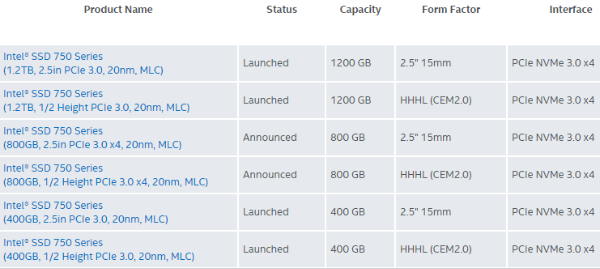Intel SSD 750 800 GB Takes Shape, Coming Soon
The only issue we found while testing Intel's very high performance NVMe client offering is about to be addressed by the company. The initial release featured a 400 GB drive at $389 and a very large 1.2 TB model at $1,049. It's a wide gap, and one Intel could easily address as the company offers other NVMe products with the same controller in an 800 GB capacity.
Two new models appeared on the Intel ARK comparison table after the Skylake platform launch earlier this week. The new models fill the capacity and price gap left wide open in the SSD 750 product series. We say "two models" because Intel released the SSD 750 in two form factors, HHHL add-in-card (AIC) and 2.5". The 2.5" drives still use the PCIe 3.0 x4 interconnect, but with the aid of a cable for connectivity.
| Product | SSD 750 400 GB | SSD 750 800 GB | SSD 750 1.2 TB |
|---|---|---|---|
| Price (current) | $389 | Unknown ($800 est) | $1,045 |
| Status | Launched | Announced | Launched |
| Launch Date | Q2 '15 | Q3 '15 | Q2 '15 |
| Controller | Intel 3rd Gen PCIe | Intel 3rd Gen PCIe | Intel 3rd Gen PCIe |
| Interface | PCIe 3.0 x4 | PCIe 3.0 x4 | PCIe 3.0 x4 |
| # of Channels | 9 | Unknown | 18 |
| NAND Lithography | 20nm | 20nm | 20nm |
| User Capacity | 400 GB | 800 GB | 1,200 GB |
| Sequential Read | 2,200 MB/s | 2,100 MB/s | 2,400 MB/s |
| Sequential Write | 900 MB/s | 800 MB/s | 1,200 MB/s |
| Random Read | 430,000 IOPS | 420,000 IOPS | 440,000 IOPS |
| Random Write | 230,000 IOPS | 210,000 IOPS | 290,000 IOPS |
| Power - Active | up to 12 watts | up to 15 watts | up to 22 watts |
| Power - Idle | 4 watts | 4 watts | 4 watts |
| Endurance | 70 GB per day | 70 GB per day | 70 GB per day |
| Warranty | 5 years | 5 years | 5 years |
At this time we don't have pricing details. We suspect the new SSD 750 800 GB model will fall right in between the two existing drives -- so, right around $800. The ARK does list performance data. Unfortunately, the new addition offers the lowest performance of the three capacity sizes. To be fair, this shouldn't be an issue because our own performance testing shows that Intel's numbers are much lower than what the SSD 750 is capable of.
Intel hasn't detailed the configuration, but we suspect it will be different than the 9-channel 400 GB product and the 18-channel 1.2 TB model.
As a side note, the Skylake platform introduced Intel Rapid Storage Technology RAID support for PCIe storage devices. At this time, the feature does not work as it should, but we suspect motherboard manufacturers and Intel will fix the early issues quickly. Many Skylake motherboards ship with two or more m.2 slots that can operate with u.2 adapters that connect to 2.5" PCIe SSDs. We look forward to testing Intel's new 800 GB SSD 750 in RAID once available.
Flash Memory Summit kicks off Monday, August 10. Look for more storage related news all week.
Professionally IT-oriented Tom's Hardware readers are eligible for free passes to the Flash Memory Summit, a $1,695 value: Details Here.
Get Tom's Hardware's best news and in-depth reviews, straight to your inbox.
Chris Ramseyer is a Contributing Editor for Tom's Hardware, covering Storage. Follow him on Twitter and Facebook. Follow Tom's Hardware on Twitter, Facebook and Google+.

Chris Ramseyer was a senior contributing editor for Tom's Hardware. He tested and reviewed consumer storage.
